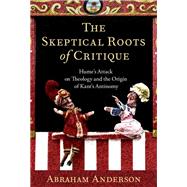
The Skeptical Roots of Critique Hume's Attack on Theology and the Origin of Kant's Antinomy
by Anderson, AbrahamBuy New
Rent Textbook
Rent Digital
Used Textbook
We're Sorry
Sold Out
Summary
In his Enquiry, Hume hints that both Samuel Clarke's theism and the dogmatic materialism he seeks to refute are underwritten by the rationalist causal principle that nothing comes from nothing, and that the clash between the two issues in a skeptical antithetic. In his Émile, Rousseau too saw Clarke's refutation as issuing in an antithetic. These works inspired the first version of Kant's Antinomy, the Dreams of a Spirit Seer; fifteen years later, Hume's Dialogues inspired the mature Antinomy of the Critique. Like Hume's Enquiry and Dialogues and Rousseau's Émile, the Critique is part of the battle for Enlightenment, the struggle against the 'despotic' reign of theological dogmatism.
Author Biography
Table of Contents
Preface
Acknowledgments
Introduction: The State of the Question
1. Awakening from Dogmatic Slumber: Sextus, Hume, and the Roots of Transcendental Idealism
2. The Impact of the Dialogues
3. Skeptical Method in the Discipline and the Antinomy: The Debt to the Dialogues
4. Rousseau, Hume, and the Dreams of a Spirit-Seer
5. The Logik Blomberg on Skeptical Method and Kant's Reading of the Enquiry
6. The Philosopher and the Common Understanding: Beattie vs. Hume, and the First Interruption of Dogmatic Slumber in the Antinomy
7. “That impious maxim of the ancient philosophy”
8. “All the philosophers of antiquity, with the sole exception of the Epicurean School”: Clarke, Bayle, and Hume on the creation of matter and the roots of the Antinomy
9. Hume and Clarke in the Beweisgrund
10. “If, for instance, I at this moment arise from my chair”: Clarke's Demonstration and the Antinomy
Afterword
Bibliography
Index
An electronic version of this book is available through VitalSource.
This book is viewable on PC, Mac, iPhone, iPad, iPod Touch, and most smartphones.
By purchasing, you will be able to view this book online, as well as download it, for the chosen number of days.
Digital License
You are licensing a digital product for a set duration. Durations are set forth in the product description, with "Lifetime" typically meaning five (5) years of online access and permanent download to a supported device. All licenses are non-transferable.
More details can be found here.
A downloadable version of this book is available through the eCampus Reader or compatible Adobe readers.
Applications are available on iOS, Android, PC, Mac, and Windows Mobile platforms.
Please view the compatibility matrix prior to purchase.
